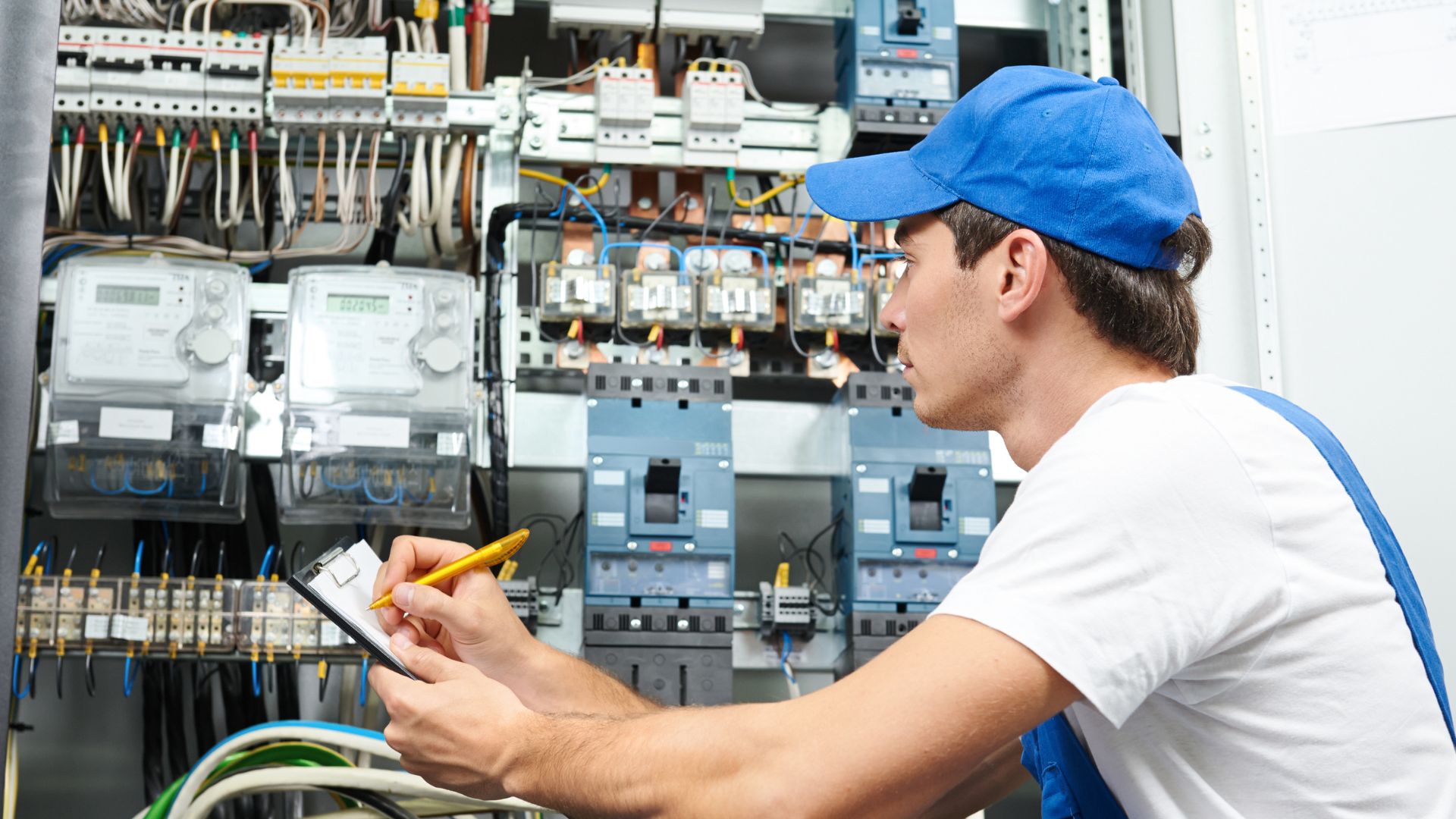Wondering how many CE hours do you need to renew your electrician license? For most journeyman electricians in Texas, it’s four hours of continuing education annually. If you’re a master electrician, you’ll need sixteen hours. This blog breaks down these requirements by license type to help you stay compliant and ahead in your profession.
Key Takeaways
- Texas electricians must complete specific continuing education hours annually based on their license type: 4 hours for journeyman and residential appliance installers, and 16 hours for master electricians.
- Courses must be approved by the Texas Department of Licensing and Regulation (TDLR) and cover essential topics such as the National Electrical Code and safety protocols.
- Staying organized and informed about renewal deadlines and completing CE hours proactively can prevent complications during the license renewal process.
Understanding CE Requirements for Electricians
Maintaining a professional status as an electrician in Texas involves more than just hands-on experience. It’s also about staying updated with licensing requirements, including the completion of required CE hours. For instance, Texas electricians are mandated to complete four hours of CE annually, ensuring they meet state regulations and stay informed about the latest electrical safety protocols.
These continuing education requirements are not just bureaucratic hurdles; they are designed to ensure that all electricians are up-to-date with the evolving standards of the industry, including electrical continuing education and NEC. This includes changes in the National Electrical Code, Texas Electrician Law, and other critical safety guidelines.
Meeting these requirements allows electricians to deliver safe and effective service, ensuring protection for both themselves and their clients, and providing proof of their commitment to quality and adherence to safety standards.
When it comes to common mistakes Texas electricians make when renewing their license, overlooking deadline reminders and underestimating required documentation are two of the most frequent pitfalls.
Specific Hour Requirements by License Type
The number of CE hours required for license renewal can vary significantly depending on the type of electrician license you hold. Knowing these specific requirements ensures you’re prepared when your renewal date approaches.
Here are the details for different types of electrician licenses.
Journeyman Electrician
Journeyman electricians in Texas are required to complete four hours of continuing education annually to renew. These courses need to cover essential topics such as:
- The National Electrical Code
- Safety protocols
- Legal standards specific to Texas
This ensures that journeyman electricians are not only compliant with state regulations but are also well-versed in the latest industry practices.
If you’ve already completed your four hours on the National Electrical Code, additional courses on law, rules, or safety will be necessary to meet the CE requirements. This comprehensive approach ensures that all aspects of electrical safety and legality are covered, keeping you well-prepared and knowledgeable in your field.
Master Electrician
For master electricians, the requirements are more extensive. In Texas, master electricians must complete sixteen hours of continuing education annually to maintain their license. These courses must cover critical topics relevant to the electrical industry, ensuring that master electricians stay updated with current practices and regulations.
Adhering to these CE requirements is essential to avoid complications during the license renewal process. Fulfilling these obligations allows master electricians to continue leading in their field, providing top-tier services and upholding high standards for electrical safety and professionalism.
Residential Appliance Installer
Residential appliance installers have specific continuing education (CE) requirements tailored to their trade:
- In Texas, they need to complete four hours of continuing education for license renewal.
- These courses differ from general electrician requirements.
- The courses are designed to address the unique challenges and regulations pertinent to residential appliance installation.
Meeting these requirements ensures residential appliance installers remain compliant with state regulations and are equipped with the latest knowledge and skills for safe and effective job performance.
Approved Course Content
Fulfilling your CE requirements necessitates taking courses approved by the Texas Department of Licensing and Regulation (TDLR). These courses must cover specific topics such as:
- The National Electrical Code
- Texas Electrician Law
- Texas Administrative Rules
- Electrical Safety as per NFPA 70E
This ensures that the education you receive is relevant and comprehensive.
Each hour of continuing education is defined as 50 minutes of actual instruction time. Electricians receive credit for each continuing education course only once, regardless of repeated attendance. This policy ensures that the CE hours contribute meaningfully to your professional development rather than just fulfilling a requirement. One hour of this education is essential for maintaining your skills.
How to Complete Your CE Hours
Completing your CE hours can be done through various methods, including online courses, workshops, and seminars. Online TDLR-approved courses are a popular and recommended way for electricians to fulfill their CE requirements due to their flexibility and convenience.
Here are more details on these sign page options.
Online CE Courses
Online continuing education courses offer a level of flexibility that is hard to beat. Electricians can complete these courses at their own pace, accessing materials anytime that suits their schedule. Many online platforms provide interactive materials and assessments to enhance the learning experience, ensuring that the education is both engaging and effective. The electricians program is designed to meet the needs of professionals seeking to advance their skills.
Enrolling in these courses is straightforward. The steps include registering online using your computer or any mobile device, completing the course at your own pace, and then receiving your certificate upon completion of completed courses. This seamless process makes it easier for electricians to stay compliant with their CE requirements without disrupting their busy schedules.
Read more: How to Find Electrician CE Courses That Fit Your Schedule
Finding Approved Providers
Finding an approved CE course provider is crucial for fulfilling your license renewal requirements. Electricians can check state licensing board websites or local trade associations for lists of approved providers. These resources often provide up-to-date information on accredited courses that meet the necessary standards.
Verifying that the course provider is accredited and recognized by state licensing boards is crucial. Many online platforms are acknowledged for offering state-approved CE courses, ensuring that the education you receive is valid and counts towards your CE requirements.
Renewal Process Overview
The renewal process for an electrician license involves several steps. Firstly, electricians must complete a renewal application online and pay a $20 non-refundable fee. Completing these steps before your license expires helps avoid complications.
If your license has expired for over 18 months but less than three years, it must be renewed by mail with a completed form and a renewal fee. Licenses that have been expired for more than three years cannot be renewed and require a new application. Some states may also impose late fees if the renewal application is submitted past the deadline.
Renewal Fees and Deadlines
Renewing your electrician license involves not just completing the necessary CE hours but also paying the required fees. Electrician licenses must be renewed annually, with reminders typically sent out approximately 60 days before the expiration date. The renewal fee for an apprentice electrician license is $20, with fees varying based on the type of license and its expiration status.
If your license expires within 18 months, it can be renewed online with an additional fee. However, if it has expired for over three years, you will need to reapply as a new applicant rather than renewing. Keeping track of these deadlines and fees is crucial to avoid any interruptions in your professional practice.
Reporting and Verification of CE Hours
Reporting and verifying your CE hours is a critical part of the license renewal process. The process involves:
- CE providers reporting your CE hours.
- This reporting being done to the TDLR.
- Ensuring that your completed hours are accurately recorded.
- Counting these hours towards your license renewal.
Electricians should verify that their CE hours are accurately recorded by the TDLR. This verification prevents issues or delays, ensuring your license remains valid and current.
Special Considerations
There are several special considerations to keep in mind when renewing your electrician license. Electrical apprentices must complete four hours of continuing education or be enrolled in a registered apprenticeship training program. Instructors can earn CE credits for teaching sections of a course, provided they also complete the remaining portions for full credit.
Applicants with criminal convictions must submit a Criminal History Questionnaire and may face case-by-case reviews for license eligibility. This review process can take anywhere from one week to six weeks to complete, depending on the complexity of the case.
Awareness of these special considerations aids in navigating the renewal process more smoothly and helps you apply it more effectively.
Tips for Successful License Renewal
Staying organized and proactive ensures a smooth license renewal process. Set reminders for important deadlines to avoid last-minute rushes. Organize all required documents early, so you have everything ready when it’s time to renew.
Licensees must:
- Keep their course completion certificates for one year in case of inspection.
- Utilize online resources to streamline the renewal process and stay compliant with the requirements.
- Regularly check for updates or changes to renewal requirements to stay on top of their obligations.
Final Thoughts on Electrician License Renewal
Staying compliant with Texas licensing regulations requires completing the correct number of CE hours, understanding course requirements, and renewing your license on time. From journeyman electricians needing 4 hours to master electricians requiring 16 hours annually, knowing these rules ensures safety, professionalism, and uninterrupted work opportunities.
At State Approved Continuing Education, we make the process simple with approved courses tailored to the requirements of electrician continuing education in Texas. Our convenient online programs allow you to complete CE hours at your own pace, keeping you on track for a smooth and stress-free license renewal. Beyond electrician CE, we also provide a wide range of professional training options, including cosmetology courses, seller training, auctioneer license renewal courses, and more. Enroll in a course or contact us to learn more about the right program for your licensing needs.
Frequently Asked Questions
How many continuing education hours are required for journeyman electricians in Texas?
Journeyman electricians must complete 4 hours of CE annually. These courses must cover the National Electrical Code, Texas law, safety protocols, and administrative rules to ensure compliance with TDLR requirements.
What are the CE requirements for master electricians in Texas?
Master electricians are required to complete 16 hours of CE annually. These hours focus on advanced safety standards, NEC updates, and Texas-specific regulations, helping master electricians stay current and lead effectively in their field.
Do residential appliance installers need CE hours for license renewal?
Yes. Residential appliance installers must complete 4 hours of CE annually, with courses designed to address the unique regulations and safety considerations relevant to appliance installation in Texas homes.
Can electricians complete CE hours online?
Absolutely. Many TDLR-approved online courses are available, allowing electricians to complete CE hours at their own pace. Online learning is flexible, accessible from any device, and includes interactive tools to make the process engaging and efficient.
How are CE hours reported to the Texas Department of Licensing and Regulation (TDLR)?
Approved providers report CE completions directly to TDLR. Electricians should verify their hours have been recorded correctly before renewal to avoid delays. Keeping course completion certificates for at least one year is recommended in case of audits.



